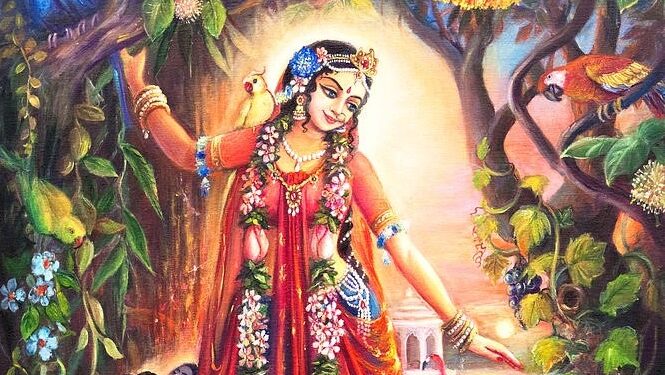Tulasī saw Śaṅkhacūḍa approaching in his jeweled airplane and noticed that he was in the prime of his youth. He was handsome like Cupid, white-complexioned like the campaka flower and decorated with gems. His face resembled the full moon of autumn, his eyes looked like lotuses in full bloom, and his cheeks flashed with the glow of his earrings. A pārijāta flower garlanded his neck, musk and saffron anointed his body, and sandal paste perfumed his person.
As he came closer, Tulasī hid her face in her shawl and smiled at him with sidelong glances. Blushing at the thought of this first meeting, she bowed her head nervously and eagerly drank in with her eyes the lotus of his face.
Śaṅkhacūḍa also gazed at Tulasī, seated as she was on a lovely bed strewn with flowers and sandalwood. Her teeth shown like pearls, her lips were like bimba fruit, her nose was graceful and her complexion golden. She resembled the autumnal moon. Adding to her grace, just below the parting of her hair, was the mark of sandal paste and musk; and just below them, a mark of vermilion. She had a low yet deep navel, and below it, three lovely abdominal folds. Her palms were reddish, her fingernails were glowing, and her feet were radiant and crimson, colored with lac-dye. Her glowing toenails surpassed the glow of the autumn moon, giving her an unrivaled beauty.
Tulasī was adorned with lovely jingling ornaments, and the knot of hair at the back of her head was decorated with a jasmine wreath. Shark-shaped earrings adorned her cheeks while a diamond necklace beautified her breast. She wore gorgeous bangles of conch on her arms and wrists, as well as precious jewels on her fingers.
Śaṅkhacūḍa sat down and said to her, “O beautiful girl, whose daughter are you? And how have you come to this forest? You look most fortunate and blessed. Indeed, you are the personification of heavenly joy-the best of women! You are a model of loveliness and can certainly bewilder even the saints!”
When Tulasī gave no reply, he asked, “O gracious one, why don’t you speak? I am your servant, so please greet me with the melody of your speech.”
Her head lowered, her face smiling, the beautiful-eyed Tulasī said, “I am the daughter of King Dharmadhvaja and have been practicing asceticism here. But who are you? And why are you talking to me? If a noble man sees a virtuous woman alone, he does not talk to her. So go away-wherever you please.”
But Śaṅkhacūḍa did not move.
Tulasī continued. “The śāstras say that only a degraded man desires a woman. At first a woman is sweet to a man, but later proves fatal. Though her mouth rains honey, her heart is like a jar of poison. She uses sweet words but her heart is sharp like a razor. To achieve her own selfish ends she is submissive to her husband; otherwise, she is unsubmissive. While her face looks cheerful, her heart is dirty. Even the Vedas and the Purāṇas cannot fathom her character. A wise man never trusts a base woman. She has no friend or enemy; for all she wants are new lovers. When a woman sees a well-dressed man, she inwardly desires him, but outwardly she appears chaste and modest. She is naturally passionate, attracts men’s minds, and eagerly engages in sex. Though outwardly she hides her lust and appears modest, when she meets her lover in secret, she is ready to swallow him up. When she does not have sex with him, she feels offended, her body burns with anger, and she begins to quarrel. When her passions are fully satisfied, she becomes cheerful; when unsatisfied, morose.
“A woman likes a good lover more than sweet foods or refreshing drinks; she likes him even more than her own son; he is dearer to her than her life. But if the lover becomes impotent or aged, she regards him as an enemy. Quarrels and anger ensue. Then she devours him as a snake eats a rat. She is rashness personified and a mine of vices. A woman is hypocritical, obstinate and unfaithful. Even Lord Brahmā and other gods are deluded by her. She is a hindrance on the path of austerity, an obstacle to liberation, an impediment to developing faith in Lord Hari, a refuge of all delusion and a living chain that binds men to the world. She is like a magician and is as false as dreams. She appears to be very beautiful, but is she is a bucket of stool, urine, gas and blood. When God created her, he arranged that she should become the spirit of delusion to the deluded and poison to those who desire liberation. Thus, on no account should a woman be desired, and by all means she should be avoided.”
Śaṅkhacūḍa smiled and then answered, “O goddess, what you have said is not completely false. It is partly true and partly false. From the Creator have come chaste and unchaste women. One is praiseworthy, the other is not. Examples of chaste women are Lakṣmī, Sarasvatī, Durgā, Sāvitrī and Rādhā. Women who are expansions of them are auspicious, glorious and very commendable, such as Śatarūpa, Devahūti, Svadhā, Svāhā, Dakṣiṇā, Anasūya, Gaṅgā, Diti, Aditi, Vedavatī, etc. In every yuga cycle these women are excellent. The heavenly prostitutes are also expansions and partial expansions of the above women, but they are not praiseworthy because they are unchaste.
Women who are in the mode of goodness are virtuous and pure. The sages declare them to be excellent. But those who are in the modes of passion and ignorance are not so praiseworthy. The passionate ones are fond of sense pleasures, indulge in them, and always want to fulfill their selfish goals. Such women are usually insincere, deluded, and irreligious. Generally, they are unchaste. But woman in the mode of ignorance are considered the worst. They are irresistible.
“A virtuous man would never court another man’s wife in either public or private. But I have come to you by Lord Brahmā’s command-to marry you according to the Gāndharva rite. (In this, the bride and bridegroom meet each other of their own accord and consummate their meeting in sexual union. No sacred rituals are necessary.)
“My name is Śaṅkhacūḍa. When the demigods see me, they flee in fear. In my previous birth, I lived in Goloka and was a cowherd boy named Sudāmā. I was a close friend of Śrī Kṛṣṇa’s, one of His attendants. I was one of the eight celebrated cowherds. Then Śrīmatī Rādhārāṇī cursed me to be born in India in a demon family. By Kṛṣṇa’s grace and by His mantra, I am a jātismarā, that is, I know the history of my previous birth. You also are a jātismarā. So you know that in your previous birth, in Goloka, when Rādhārāṇī caught you alone with Kṛṣṇa, she became angry and cursed you to be born here, in India. In Goloka I very much wanted to consort with you; but because I feared Rādhārāṇī, I did not do so.”
Śaṅkhacūḍa stopped talking. Tulasī smiled and cheerfully said, “Persons like you are famous in this world and good women desire such husbands. You have defeated me in argument. A man who is conquered by a woman is very impure and condemned by people in general. The forefathers and the demigods regard men who are conquered by women as low and contemptible. Even their fathers and mothers mentally despise them. The Vedas say that when a child is born or a relative dies, the brāhmaṇas are purified in ten days; the kṣatriyas in twelve days; the vaiśyas in fifteen days; and the śūdras as well as other low classes in twenty-one days. But a man conquered by a woman always remains impure. Only when his body is burned to ashes does he become purified. Neither the ancestors nor the demigods accept from him offerings of cakes, flowers, etc. Men whose hearts are totally conquered by women acquire no fruits from their knowledge, austerities, japa, fire sacrifices, worship, learning or fame.
“I tested you to determine how strong you are in knowledge. One should choose one’s husband by examining a man’s merits and defects. If one gives his daughter in marriage to a man devoid of good qualifications, to an old man, to a man who is ignorant or poor, illiterate, diseased, ugly, wrathful, harsh, lame, limbless, deaf, dumb, inactive, or impotent-this sin is equivalent to the sin of murdering a brāhmaṇa. But if one gives his daughter in marriage to a young Vaiṣṇava who is learned, well-qualified and peaceful, one acquires the fruits of performing ten horse sacrifices. If one raises a daughter and then sells her out of greed for profit, he falls to the hell known as Kumbhīpāka. There, for a period equal to fourteen of Lord Indra’s lifespans, such a sinner has to drink his daughter’s urine and eat her stool as well as be bitten by worms and crows. When this period ends, he has to be born in this world as a diseased person and earn his livelihood by selling and carrying meat.”















